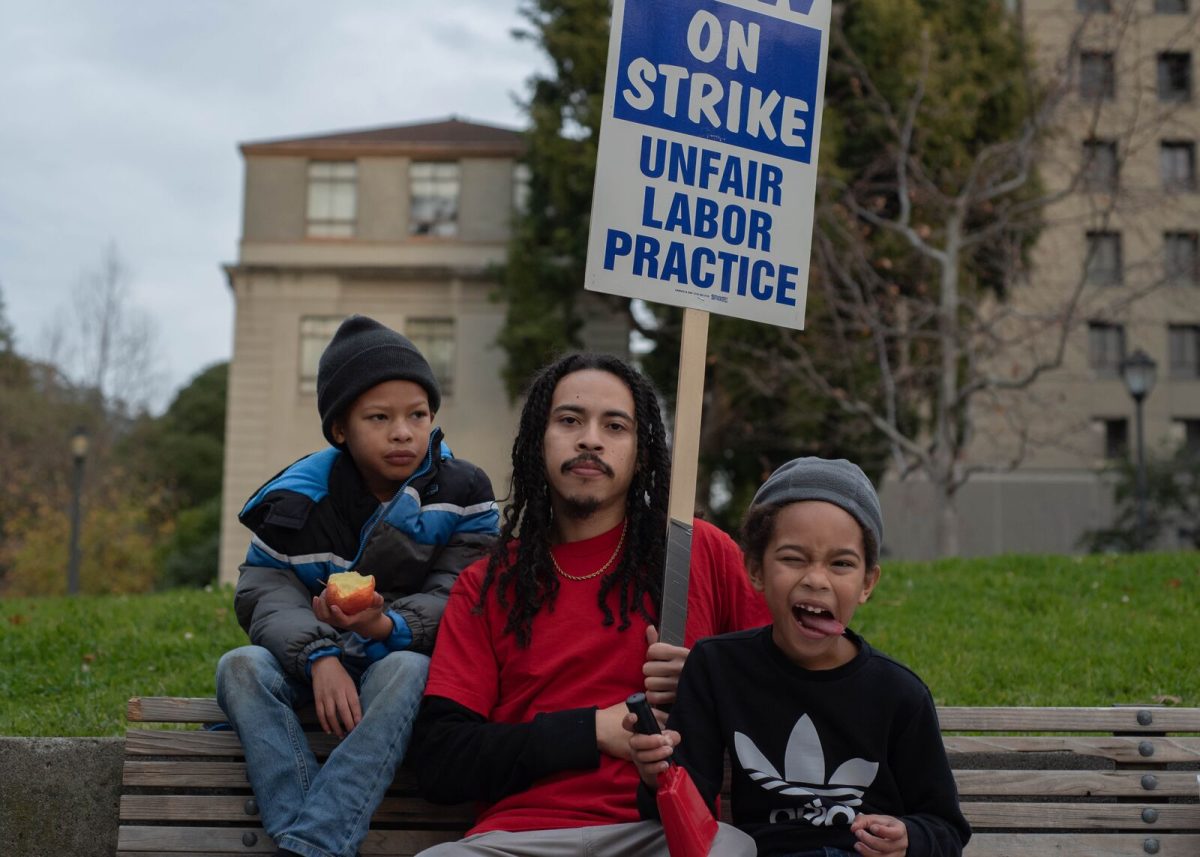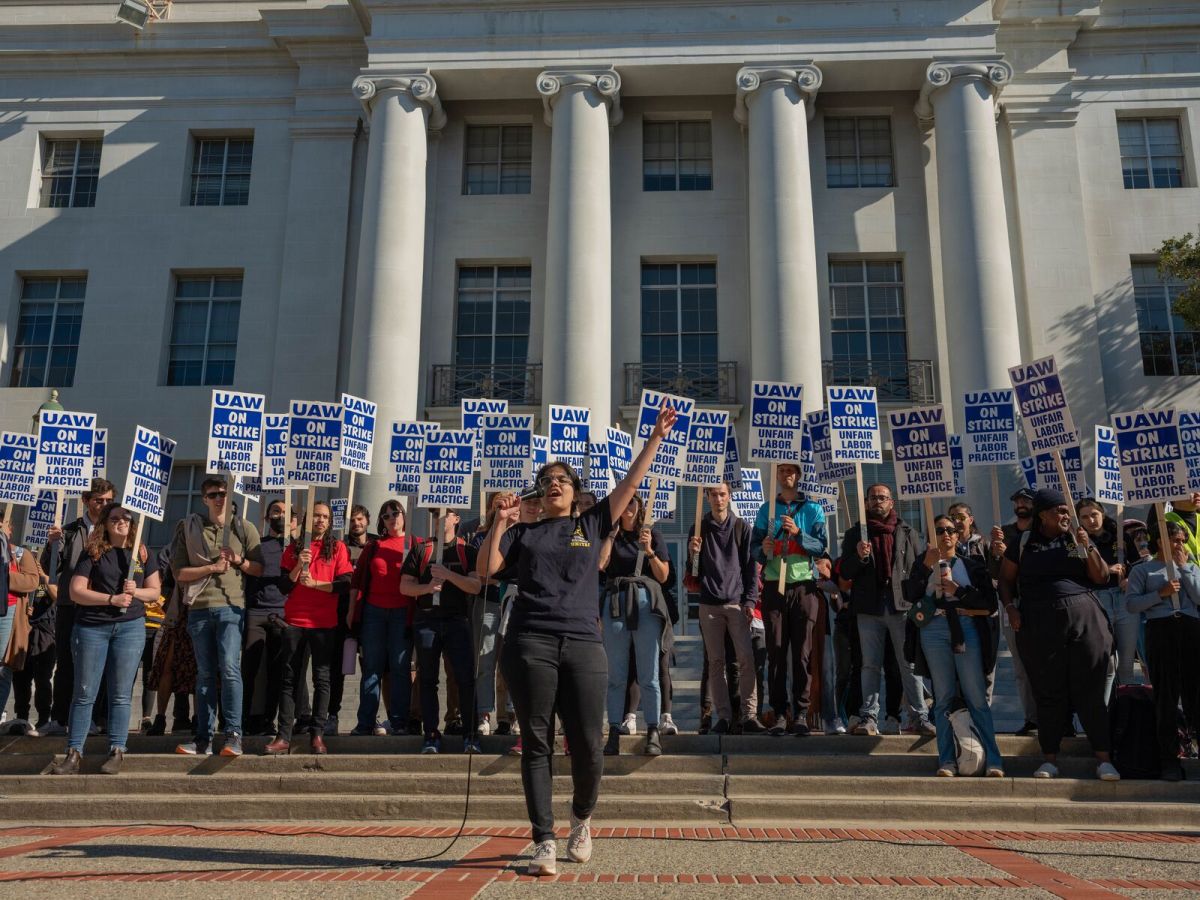
Vincente Perez calculates his days “down to the minute.”
On weekdays, he rises at 7:30 a.m. and starts breakfast, which usually consists of cereal and fruit or a Pop-Tart. He wakes up his twins, Kaiyo and Mikai, at 7:45 a.m., and they get dressed, have breakfast, clear dishes, and pack their bags. Perez styles their hair, hands them their masks, and, at 8:20 a.m. they leave the house to walk to Ocean View Elementary School in Albany. At 8:30, the bell rings.
Perez, 28, is a fifth-year UC Berkeley doctoral student in the performance studies department. His work day typically consists of a backlog of papers to grade, emails to respond to and discussion sections to prepare and facilitate. He’s an instructor for an American Cultures course, an undergraduate requirement, and teaches a class of 60.
But not today. Along with 48,000 other academic workers across the University of California system, Perez walked off the job in mid-November in hopes of securing higher pay, better working conditions and more benefits. (Postdocs and academic researchers signed off on union contracts on Dec. 9 and are no longer striking. Academic student employees and student researchers, however, remain on strike as bargaining continues.)
As he’s not teaching, Perez’s working hours are now spent writing his dissertation, poring over readings, finding opportunities to publish his work, and applying to grants and fellowships to pay the bills.
The twins return from school at 2 p.m., and from then on, life becomes a structured blur of activities: he plays Super Mario Bros. with them, helps them with homework, cooks dinner, crosses a chore or two off a long to-do list, tucks them into bed and, if deadlines are approaching, squeezes in another work session once they’re asleep.
“Every day, I’ve blocked out time to make progress on each of these things, which means my social life is nonexistent,” Perez says. “My social life …. it’s who’s willing to come sit with me while I parent my children.”
Most of Perez’s $2,300 monthly stipend, which he receives during the nine months of the school year, goes back to the UC: His below-market rent at the University Village in Albany, a UC Berkeley family student housing complex, is $2,125. This year, he received another $12,000 from Cal, the maximum amount possible, in the form of a grant that’s earmarked for UC Berkeley student parents. (The UC can legally withhold pay for striking workers, but that has not yet happened. If the UC ultimately decides to deduct wages, the United Auto Workers strike fund will kick in to make up for some lost wages, providing $400 per week to members who have fulfilled their picketing duties.)
Money is tight, and Perez, a single parent, doesn’t receive child support. In the summer, he sends Kaiyo and Mikai off to live with their mother and works as much as he can, picking up Uber shifts, writing and performing poetry and working as a digital archivist for Cal’s graduate student body.
Perez, a single parent, is one of the estimated 1,300 graduate students at UC Berkeley who are parents, 10% of the total 13,000 graduate students at Cal.
Although parents make up a minority of UC Berkeley’s student population, they tend to feel the impacts of the Bay Area’s high cost of living more, shouldering child care costs and unexpected medical bills. Some of the parent workers who teach essential courses to undergraduates, and contribute to the research the university is known for, told Berkeleyside they struggle to make ends meet, relying on side jobs and loans to stay afloat. Many can barely afford rent in Oakland and Albany, let alone in Berkeley, where the median rent — at $2,875 across all properties — is even higher.
Responding to claims that the UC doesn’t pay student employees enough to live on, UC officials say that salary rates reflect a part-time work schedule: “At UC, academic student employment is strictly part-time in order to support students while they are pursuing their graduate or doctoral degree,” the university said in statement posted on a frequently updated UC Berkeley webpage about the strike.
But many academic workers have said they regularly work beyond the 20 hours they’re compensated for, often due to pressure from their advisors and faculty.
A statewide string of ‘parent pickets’ reaches Berkeley
Dead week, or the week before finals at UC Berkeley, is usually an eerily quiet time on campus, with most students holed up in libraries for hours on end. The usual silence at this time of the year, however, was interrupted Friday afternoon by the chanting of some 20 parent workers and their children as part of a string of “parent pickets” organized across the state.
Bubble-wand stations and ring tosses had been set up to keep the children occupied. A parent chased after a runaway toddler, pleading with him to wear his jacket; another consoled a crying infant.
“Parents have a lot to bear, UC needs to learn to share,” the small crowd chanted, led by Perez’ 7-year-old son, Kaiyo, who had gotten a hold of the megaphone. His brother Mikai also had a turn with the megaphone. (At another point, Kaiyo began meowing into the megaphone, garnering more than a few head turns and chuckles from befuddled passersby.)
Better wages, significantly higher child care reimbursements, and the abolishment of the non-residential supplemental tuition — the fees that international workers have to pay in order to work — would do wonders for UC parent workers, Perez said.
But as negotiations dragged on for weeks, Perez and other parent workers began to worry that the end results could look nothing like the unions’ original demands, which included a wage floor increase to $54,000, a $2,000 monthly child care reimbursement, full tuition subsidies at UC-affiliated child care programs, dependent health care and expanded paid family leave.
“We don’t want to be left behind,” Perez said, on why he and a group of other UC Berkeley parent workers held a picketing event. The group included third-year biophysics doctoral candidate and researcher Alicia Zeng.
“We came to the awareness that if we don’t organize, then people won’t take our demands seriously,” Zeng said.
UC parenting students have had a relatively small voice during the bargaining process, mostly because parents are usually “scrambling to put dinner on their kids’ plates,” she said. Zeng, who is a member of the student researchers union and has been on strike, said there are currently no UC Berkeley parents on her union’s bargaining team.
Parent workers seek subsidies for child care
Zachary Hicks, 35, is a sixth-year doctoral candidate in the Slavic languages and literature department on strike and parent to an 8-month-old infant who requires “constant attention.” He pays around $1,500 per month for a private daycare in Oakland, which he considers a bargain.
By contrast, UC Berkeley’s affiliated child care program costs between $2,070 and $2,720 (exact program costs depend on the child’s age) for the families of employees and students.
The UC’s Dec. 7 offer for academic student employees and graduate student researchers proposed child care reimbursements of $2,025 per semester, plus $1,350 for the summer session. In the previous academic student employees union contract, which expired in June, academic student employees were eligible for up to $1,650 per semester. (The student researchers’ union, which formed last year, has been negotiating its first contract.)
Some parents noted that these amounts wouldn’t even cover a full month of tuition at UC Berkeley’s child care program.
The UC has said its proposals are “generous” and “provide strong support for students.” Hicks, who currently earns $30,000, doesn’t see it that way.
“If you’ve gone through this, and understand how much time and energy and care it takes to raise a young child … this doesn’t appear generous to me at all,” Hicks said.
He and his spouse, an assistant professor at Saint Mary’s College, recently took out a $350 monthly loan for a car, which she uses to take their infant to daycare in Oakland. Every day, Hicks bikes 40 minutes uphill to get to the UC Berkeley campus.
To make loan and minimum credit card payments on time, Hicks has resorted to frugality, sometimes to the detriment of his health. He regularly suffers from throbbing headaches and face pain because it costs too much to have his wisdom teeth removed.
“They get infected all the time,” Hicks said.
Zeng, the graduate researcher, said she is not enrolled in any classes this year and spends around 50 hours per week working on lab research. The UC considers her a part-time employee. She lives in Richmond with Storm, her talkative 2-year-old toddler. Her biophysics graduate program provides graduate researchers with an annual stipend of $41,000.
Zeng sees herself as more privileged than her peers; her stipend is on the higher end of the spectrum, and her parents pitch in for child care, she says.
As a mentor to undergraduate students pursuing careers in science, Zeng sees the UC’s current pay and child care subsidy levels as a barrier to pursuing advanced degrees — one that disproportionately impacts minority groups, people without generational wealth and women.
“It’s not just about taking care of children. It’s also about involving women in science and in other fields,” Zeng said. “The current levels of stipends, child care and health care subsidies not only harm existing parents, but also curtail women’s participation in industries requiring advanced degrees by forcing them to choose between having a family and pursuing a career.”
University of South Carolina economics professor Jessica Brown agreed. “Grad school takes a long time, and it’s many of the key years of childbearing for women,” she said. “It’s not feasible for many women to wait until they’re out of grad school.”
Brown, who studies the child care industry, said child care subsidies can be helpful, but they may not address underlying issues like staffing shortages. Her research, which analyzed data from historical recessions, found that even though child care employment falls at roughly the same rate as recession, the industry needs more time to recover than the rest of the economy.
In practice, that means that, after recessions, there might be more children needing child care than there are available slots. (California lost roughly a third of its child care workforce in 2020, and the industry has been slow to recover.)
When there aren’t enough child care workers, children end up suffering.
“You might settle for lower quality care if you’re not able to find the quality that you want, and that certainly has implications for childhood development,” Brown said. “Those early years are especially important for future outcomes.”
Cal’s student health plans aren’t affordable, parents say
Robin D. López, 33, a fifth-year doctoral candidate in the environmental science, policy and management department at UC Berkeley, went on strike in November. He said more affordable health care for dependents would help relieve some of the stress of parent workers in life situations that can’t be prepared for.
López is a parent of two children: one is 12 and the other is a 10-week-old baby who was recently discharged from the neonatal intensive care unit after undergoing complex surgery. His wife, pregnant at the time, was rendered temporarily disabled after falling down the stairs and fracturing her lower leg and ankle in three different places.
He feels fortunate that his wife is on a Kaiser health insurance plan and can list their children as dependents, because the cost of insuring his two children under the university-sponsored student health insurance plan would cost upwards of $6,000 per semester, which he said he can’t afford because he makes roughly $32,000 a year and rent costs $2,395. He’s had to take a $10,000 loan this year to cover medical expenses.
Both the academic student employees union and student researchers union have been negotiating with the UC for a remission of their children’s health insurance. The UC’s proposals for the two unions have not yet included any articles that would lower the cost of dependent health care.
To pursue his doctorate degree, López gave up a better-paying job as a research associate at the Berkeley National Lab in the hope he would be able to make more novel contributions in the field. “It hurts, because I came [to UC Berkeley] with the idea that I would be taken care of,” he said.
“We just want to be able to afford to live where we work and have our kids and not have to compromise on things like medical care, or daycare or utilities or groceries,” Hicks said. “I’ve had to compromise on all of those things at different times. They are hard choices.”


